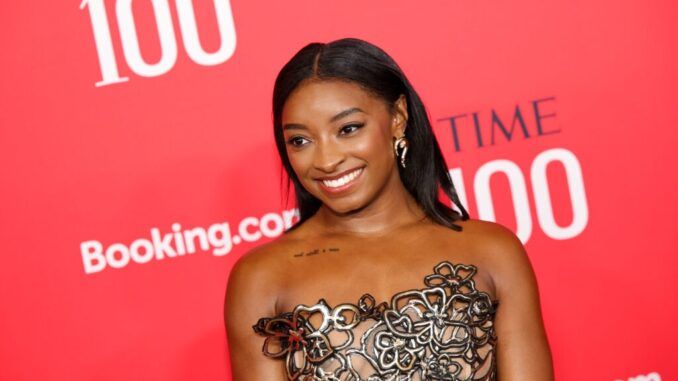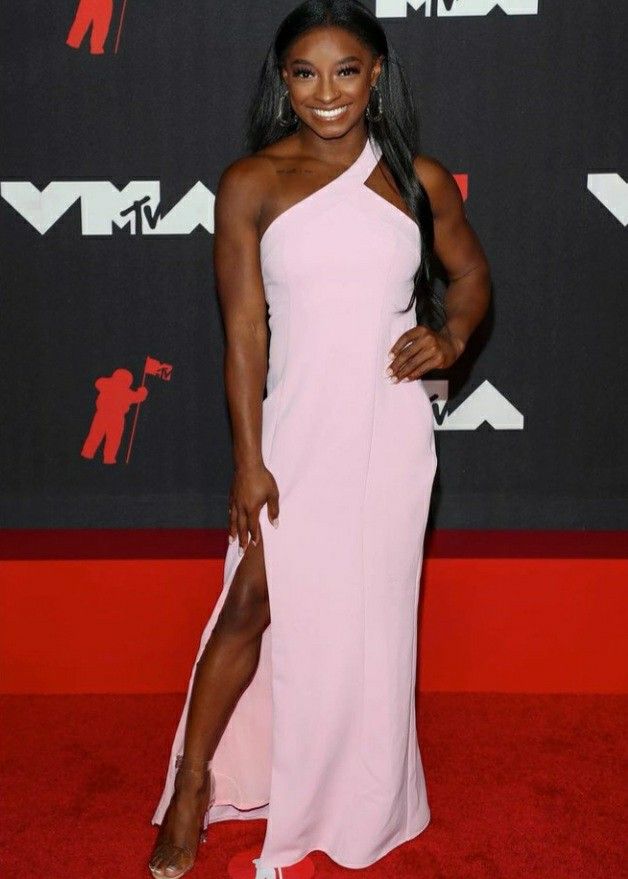
Simone Biles returned to the headlines this week, with the seven-time Olympic gold medalist taking to X to voice support for trans athletes in women’s sports, emphasizing that she believes the conversation “starts with empathy and respect.” Earlier this month, Biles called out anti-trans athlete activist and former NCAA swimmer Riley Gaines for ridiculing a Minnesota high school softball team, calling Gaines a “sore loser” and a “bully.”
Gaines, who swam for the University of Kentucky, tied trans UPenn swimmer Lia Thomas for fifth place in the 200-yard freestyle at the 2022 NCAA Division I Swimming and Diving Championships. The event sparked her outspoken campaign against trans athletes in women’s sports. “You should be uplifting the trans community and perhaps finding a way to make sports inclusive OR creating a new avenue where trans [athletes] feel safe in sports,” Biles originally tweeted at Gaines.
Biles later clarified her comments, posting “I’ve always believed competitive equity & inclusivity are both essential in sport.” “The current system doesn’t adequately balance these important principles, which often leads to frustration and heated exchanges,” she continued. While Biles apologized for a comment made about Gaines’s body, she also defended her objection to Gaines singling out individual trans youth athletes.
“I was not advocating for policies that compromise fairness in women’s sports,” said Biles. “My objection is to be singling out children for public scrutiny in ways that feel personal and harmful.” “Individual athletes — especially kids — should never be the focus of criticism of a flawed system they have no control over.”
The world of sports has always been filled with fierce competition, but recently, it’s been the arena for an entirely different kind of battle—one centered around equality, gender, and the future of athletics. Simone Biles, a renowned Olympic gymnast, has always been vocal about her support for inclusivity, while Riley Gaines, a former swimmer, has made headlines with her anti-trans stance regarding transgender athletes. This social media exchange between the two athletes has sparked conversations across the globe, highlighting the ever-growing debate on whether transgender women should compete in women’s sports.
So, what exactly went down between Simone Biles and Riley Gaines? Let’s break it down, explore the details of their social media confrontation, and dive into the heart of the debate.
Who is Riley Gaines, and What Is Her Stance on Transgender Athletes?
Riley Gaines gained attention not only for her swimming career but also for her controversial stance on transgender athletes in women’s sports. She is a vocal critic of transgender women competing in women’s categories, arguing that it creates an unfair advantage. Her perspective aligns with those who believe that the physical advantages some trans women might have, such as muscle mass or height, could give them an edge over cisgender women in sports.
This view has sparked significant debate, with many arguing that it is discriminatory and doesn’t consider the complexities of gender identity, hormone therapy, and individual athlete abilities.
Simone Biles: A Champion for Inclusivity and Gender Equality
Simone Biles, a gymnast who has made history multiple times, is widely regarded as one of the greatest athletes of all time. But what sets her apart even more is her unwavering commitment to advocating for inclusivity. Biles has been outspoken about the importance of mental health, body autonomy, and, importantly, supporting transgender athletes. She has consistently emphasized that sports should be a space for all athletes, regardless of their gender identity.
Biles’ stance on inclusion and her overall positive influence within the sports world have earned her widespread admiration and support, making her a role model not just for aspiring gymnasts, but for anyone who believes in equality and fairness.
The Social Media Exchange: What Sparked the Controversy?
The heated exchange between Simone Biles and Riley Gaines began when Biles made a post in support of transgender athletes, which gained significant attention on Twitter. Her message was simple: everyone deserves a chance to compete fairly and equally, regardless of their gender identity.
In response, Riley Gaines, known for her opposition to transgender women in women’s sports, took to social media to criticize Biles’ views. Gaines argued that allowing trans women to compete in women’s sports jeopardizes fairness and safety for cisgender women athletes.
The comments between the two athletes quickly escalated, with Biles defending the rights of transgender athletes and calling out the narrow view Gaines was promoting.
Why the Simone Biles and Riley Gaines Social Media Drama Matters
This social media clash isn’t just about two athletes exchanging words. It reflects a much larger, deeply rooted debate about fairness in sports, the rights of transgender individuals, and the inclusion of marginalized communities in competitive arenas. As we move toward a more inclusive society, issues like these are likely to continue to spark debate, and social media has become one of the most visible platforms for these conversations to unfold.
Simone Biles’ Response: A Powerful Message of Inclusivity
Simone Biles didn’t hold back in her response to Riley Gaines. In a series of posts, Biles emphasized the importance of supporting transgender athletes. She argued that the focus should be on creating an inclusive environment where athletes, regardless of their gender identity, can compete on equal footing.
Biles’ response wasn’t just about defending transgender athletes. She used her platform to shine a light on the emotional and psychological toll that these debates can take on transgender individuals. She made it clear that sports should be about fostering an environment of respect and support, not division.
Transgender Athletes in Women’s Sports: The Larger Debate
The controversy surrounding transgender athletes is not limited to Simone Biles and Riley Gaines. It’s a global conversation that has sparked political debates, legal challenges, and public outcry. In recent years, a growing number of states in the U.S. have passed laws restricting transgender women from competing in women’s sports.
Advocates for transgender inclusion argue that these policies are discriminatory and deny transgender individuals the right to compete based on their gender identity. Critics, on the other hand, argue that these laws are necessary to preserve fairness in women’s sports.
The Science of Transgender Athletes: Do They Have an Advantage?
One of the central arguments against transgender women in sports revolves around the idea that they possess a physical advantage. Many critics of transgender inclusion argue that testosterone, muscle mass, and other physical traits give trans women an inherent edge over cisgender women.
However, research on this topic is still developing. Studies on hormone therapy, which trans women undergo as part of their transition, suggest that it significantly reduces any advantage they might have in terms of strength or endurance. In fact, some studies show that after a period of hormone treatment, transgender women may not have any significant advantage over cisgender women in many sports.
The Impact of the Debate on Transgender Athletes
For transgender athletes, the impact of this debate goes beyond the competitive arena. It can affect their mental health, sense of belonging, and overall well-being. The constant questioning of their place in sports can contribute to feelings of alienation, anxiety, and depression.
Athletes like Biles, who advocate for inclusivity, are making it clear that every athlete deserves the opportunity to pursue their dreams, free from discrimination and judgment based on their gender identity.
The Role of Social Media in Shaping Public Opinion
In today’s digital age, social media plays a critical role in shaping public opinion and fueling important conversations. The back-and-forth between Simone Biles and Riley Gaines demonstrates how quickly public figures can influence discussions on complex topics.
While social media can be a platform for misinformation, it also serves as a space for marginalized voices to be heard. For transgender athletes, platforms like Twitter and Instagram allow them to speak out and find solidarity within supportive communities.

What Does the Future Hold for Transgender Athletes?
The future of transgender athletes in women’s sports remains uncertain, especially as more states and countries continue to introduce restrictive policies. However, with athletes like Simone Biles continuing to speak out for inclusion and equity, there is hope for change. The key will be finding solutions that protect the integrity of women’s sports while ensuring fair access and opportunities for all athletes.
The Importance of Allyship in Sports
As Simone Biles has shown, being an ally to transgender athletes isn’t just about supporting their right to compete—it’s about actively challenging discriminatory views and advocating for change. Allyship involves using your platform to amplify voices that are often silenced, standing up against harmful rhetoric, and showing solidarity with those who are marginalized.
Biles’ willingness to engage in this important conversation sets a powerful example for athletes and individuals in all sectors.
Conclusion: A Call for Respect and Inclusion in Sports
The exchange between Simone Biles and Riley Gaines might have been heated, but it’s part of a much larger discussion that’s critical to the future of sports. At its heart, the debate is about fairness, equality, and the right for every athlete to have an equal opportunity to succeed, regardless of their gender identity.
Simone Biles has shown that standing up for what’s right requires courage and conviction. As this debate continues to unfold, it’s essential that we all strive to create a more inclusive environment in sports and beyond, where respect and equality are paramount.